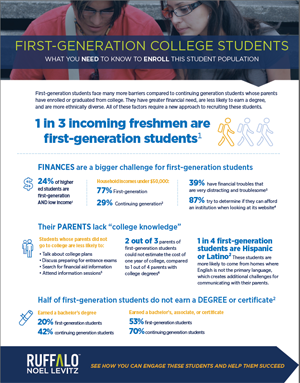 First-generation college students are a growing population. Approximately 1 in 3 college students today are first-generation, and one-quarter are classified as both first generation and low income students.
First-generation college students are a growing population. Approximately 1 in 3 college students today are first-generation, and one-quarter are classified as both first generation and low income students.
Consequently, first-generation students face many barriers compared to students with parents who attended or graduated from college. Here are just a few of those challenges:
First-Generation College Students Are Less Likely To Earn Degrees
Only 1 in 5 first-generation students earn a bachelor’s degree, compared to 4 in 10 of continuing-generation students. When looking at a bachelor’s degree, associate’s degree, or certificates, only 1 in 2 of first-generation students achieve that goal compared to 70 percent of continuing generation students.
Consider the financial challenges for some first-generation college students:
- 24% of students are first-generation are low income
- Three out of four come from families with household incomes below $50,000
- 39% have financial problems they find distracting and troublesome
Challenges For First-Generation Students and Their Parents During The College Process
Parents of first-generation students often lack “college knowledge” because they did not experience college first hand. According to Horn and Nuñez (2000), these parents are less likely to discuss or search for key information on college planning, entrance exams, and financial aid.
In another example, 2 out of 3 parents of first-generation students could not estimate accurately the cost of one year of college. For parents who had college degrees, that number drops to 1 in 4.
All of these factors show that colleges and universities need to change how they guide first-generation students on their journey to higher education. But how?
7 Ways To Engage and Enroll First-Generation College Students and Their Families
First-generation students need a path to college that connects them with the right resources to enroll and succeed. Institutions must connect with first-generation students who are the best fit and put them in position to persist, succeed, and graduate through smart engagement and tools that guide them along the way. The seven strategies below will help you identify, engage, and energize first-generation students by providing them with the information and connections they need at the moment they need them.
1. Prioritize students who are engaged.
Use real-time, personalized engagement scoring to reveal which first-generation students are the most engaged and ready for immediate outreach.
2. Make their exploration interactive.
Create personalized interactive hubs that allow students to discover the most relevant information whenever they need it.
3. Personalize their content and experience.
Meet students’ expectations for dynamic, customized content that provides a personalized experience at every stage of their journey to college.
4. Communicate across different channels.
Make sure students receive every critical communication by reaching them through every channel they use: digital, social media, email, print, and text.
5. Engage their parents.
Keep parents of first-generation students engaged and informed with their own personalized informational hubs so they can become enrollment advocates.
6. Show how they fit.
Help first-generation students explore their intellectual and career interests through interactive “fit finders,” and then connect that desire to your academic program offerings.
7. Respond to their choices.
Use responsive communications triggered by student choices to connect students to the most appropriate information, personnel, and next steps.
These seven strategies help you identify, engage, and energize first-generation students by providing the information and connections they need at the moment they need them.

For more, be sure to download Ruffalo Noel Levitz’s strategy sheet on first-generation college students:
Visit Ruffalo Noel Levitz for the strategy guide to engaging first-generation students, as well as the papers and research that provided data for this guide.
Or, schedule a time to talk with RNL’s enrollment experts on your approach to engaging and enrolling first-generation students.
*Special thanks to Ashley R. Spain, Associate Vice President for Enrollment Marketing at Ruffalo Noel Levitz—technology-enabled services, software, and consulting for higher education enrollment management and fundraising—for guest-writing this blog post. Ruffalo Noel Levitz is a Platinum sponsor of the 2018 TargetX Summit.
